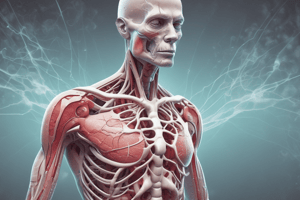Podcast
Questions and Answers
What is Hypocalcemia?
What is Hypocalcemia?
- Calcium level regulated by vitamin D only
- Normal calcium levels in the blood
- Abnormally high calcium level in the blood
- Abnormally low calcium level in the blood (correct)
Which factor does NOT affect the amount of calcium in the body?
Which factor does NOT affect the amount of calcium in the body?
- Hormones like parathyroid hormone and calcitonin
- Intestinal absorption of calcium and vitamin D
- Presence of excess vitamin C (correct)
- Calcium intake through food
What role does magnesium play in the human body?
What role does magnesium play in the human body?
- Involvement in muscle function and metabolic reactions (correct)
- Regulating only blood sugar levels
- Only found in the skeleton
- Unrelated to DNA synthesis
What test is used to measure the amount of calcium in bones?
What test is used to measure the amount of calcium in bones?
Which condition can lead to Hypercalcemia?
Which condition can lead to Hypercalcemia?
Flashcards
What is hypocalcemia?
What is hypocalcemia?
A condition where the blood calcium levels are abnormally low. This can happen due to low parathyroid hormone, vitamin D deficiency, kidney failure, pancreatitis, or insufficient magnesium and protein in the blood.
What is hypercalcemia?
What is hypercalcemia?
A condition where the blood calcium levels are abnormally high. Causes can be high parathyroid hormone, vitamin D overdose, prolonged bed rest, or cancers of the bones.
What is the significance of magnesium in the body?
What is the significance of magnesium in the body?
Magnesium is a mineral crucial for the body's functions, involved in over 300 metabolic reactions. It helps regulate muscle and nerve function, blood sugar levels, blood pressure, and even protein, bone, and DNA synthesis.
What are some good sources of magnesium in the diet?
What are some good sources of magnesium in the diet?
Signup and view all the flashcards
What are the health advantages of getting enough magnesium?
What are the health advantages of getting enough magnesium?
Signup and view all the flashcards
Study Notes
Calcium in the Body
- Factors determining calcium levels:
- Dietary intake of calcium
- Calcium and vitamin D absorption by the intestine
- Phosphate levels in the body
- Certain hormones, including parathyroid hormone, calcitonin, and estrogen
- Calcium supplements
Hypocalcemia
- Definition: Abnormally low calcium level in the blood
- Causes:
- Low parathyroid hormone (PTH) levels
- Vitamin D deficiency
- Kidney failure
- Acute pancreatitis
- Insufficient magnesium and protein in the blood
Hypercalcemia
- Definition: Abnormally high calcium level in the blood
- Causes:
- High PTH levels
- Vitamin D overdose
- Prolonged bed rest or immobilization
- Cancers of bones
Calcium Test
-
Reasons for testing:
- Checking for parathyroid gland problems, kidney failure and stones
- Detecting cancers of the breast, neck, lung, and head
- Evaluating bone problems, pancreatitis, and abnormal ECG
- Determining if symptoms are caused by very high or low calcium levels
- Routine blood test
-
Bone mineral density test: Measures the amount of calcium in the bones
Calcium Test Procedure
- Patient preparation: Rest in a recumbent position for at least 30 minutes before the test
- Blood draw: Drawn without using a tourniquet
### Magnesium
- Importance: Essential for all living cells and plays critical roles in the structure and function of the human body
- Body content: The adult human body contains about 25 grams of magnesium, with over 60% in the skeleton and 27% in muscle
- Metabolic role: Involved in over 300 essential metabolic reactions
Magnesium Functions
- Overall health: Magnesium is crucial for regulating muscle and nerve function, blood sugar levels, blood pressure, and protein, bone, and DNA synthesis
- Recommended intake: Varies based on age and sex
Dietary Sources of Magnesium
- Rich sources: Legumes, nuts, seeds, whole grains, green leafy vegetables (e.g., spinach), fortified breakfast cereals, milk, yogurt, and some milk products
- Fortified foods: Fortified breakfast cereals and other fortified foods contribute to magnesium intake
Magnesium Supplements
- Availability: Available in multivitamin-mineral supplements, dietary supplements, laxatives, and products for treating heartburn and indigestion
- Better absorption: Forms like magnesium aspartate, citrate, lactate, and chloride are more easily absorbed by the body
Magnesium and Health
- High blood pressure and heart disease: Magnesium supplements might slightly decrease blood pressure, and people with higher dietary magnesium may have a lower risk of certain heart diseases and stroke
- Type 2 diabetes: Higher dietary magnesium intake is associated with a reduced risk of developing type 2 diabetes; it assists in sugar breakdown and might prevent insulin resistance
- Osteoporosis: Important for bone health, and higher magnesium intake can lead to increased bone mineral density, potentially reducing fracture and osteoporosis risk
- Magnesium safety: Magnesium from food is generally safe and not limited; the kidneys remove excess in the urine
Further Research on Magnesium
- Potential benefits of magnesium supplements for type 2 diabetes management
- Potential effectiveness of magnesium supplements for reducing osteoporosis risk or treatment
Studying That Suits You
Use AI to generate personalized quizzes and flashcards to suit your learning preferences.




